

Big Data: The organizational challenge. The Next Product Development Revolution. Big Data Roundup: The Marketing Bubble, Creating Data-Drive Organizations, Driving Innovation, Retail Banking Trends + More. Transforming Social Media Data into Predictive Analytics. Consider it the next frontier in social media marketing: While some companies fine-tune their ability to monitor social media networks, others are going one step further, fusing social media data with predictive processes.
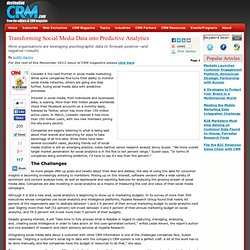
Interest in social media, from individuals and businesses alike, is soaring. More than 900 million people worldwide check their Facebook accounts on a monthly basis, followed by Twitter, which has more than 150 million active users. In March, LinkedIn claimed it had more than 160 million users, with two new members joining the site every second. Companies are eagerly listening to what is being said about their brands and searching for ways to take advantage of all this data.
While there have been several successful cases, plucking trends out of social media chatter is still an emerging practice, notes Gartner senior research analyst Jenny Sussin. The Challenges Although it is still a new area, social analytics is beginning to show up in marketing budgets. IBM's Big Data Strategy: Combine And Conquer. Big Blue is gobbling up big data companies at a steady clip.
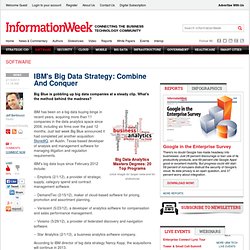
What's the method behind the madness? Open data economy: Eight business models for open data and insight from Deloitte UK. When I asked whether the push to free up government data was resulting in economic activity and startup creation, I started to receive emails from people around the United States and Europe.
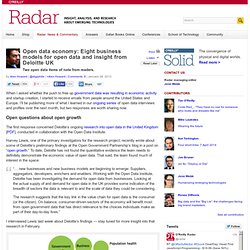
I’ll be publishing more of what I learned in our ongoing series of open data interviews and profiles over the next month, but two responses are worth sharing now. Open questions about open growth The first response concerned Deloitte’s ongoing research into open data in the United Kingdom [PDF], conducted in collaboration with the Open Data Institute. Harvey Lewis, one of the primary investigators for the research project, recently wrote about some of Deloitte’s preliminary findings at the Open Government Partnership’s blog in a post on “open growth.” To date, Deloitte has not found the quantitative evidence the team needs to definitely demonstrate the economic value of open data.
Why Data Will Never Replace Thinking - Justin Fox. By Justin Fox | 12:00 PM October 4, 2012 Big data, it has been said, is making science obsolete.

No longer do we need theories of genetics or linguistics or sociology, Wired editor Chris Anderson wrote in a manifesto four years ago: “With enough data, the numbers speak for themselves.” Last year, at the Techonomy conference outside Tucson, I heard Vivek Ranadivé — founder and CEO of financial-data software provider TIBCO, subject of a Malcolm Gladwell article on how to win at girls’ basketball, and part owner of the Golden State Warriors — say pretty much the same thing: I believe that math is trumping science. What I mean by that is you don’t really have to know why, you just have to know that if a and b happen, c will happen.
Anderson and Ranadivé are reacting to something real. What a Big-Data Business Model Looks Like - R “Ray” Wang. By R “Ray” Wang | 10:00 AM December 6, 2012 The rise of big data is an exciting — if in some cases scary — development for business.
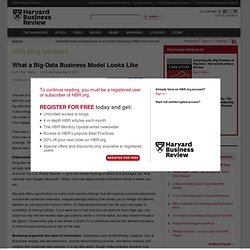
Together with the complementary technology forces of social, mobile, the cloud, and unified communications, big data brings countless new opportunities for learning about customers and their wants and needs. It also brings the potential for disruption, and realignment. Organizations that truly embrace big data can create new opportunities for strategic differentiation in this era of engagement. Those that don’t fully engage, or that misunderstand the opportunities, can lose out. Big Data: Do you need a theory [conceptual framework] when you have so much information. Cloud and big data – a fusion of two innovative IT trends. As market awareness and adoption increases, so customer confidence and clarity is growing and companies are better able to evaluate the benefits and challenges that big data presents their individual organisations.
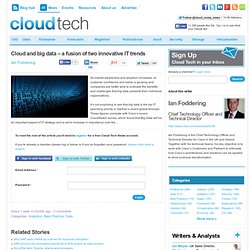
It’s not surprising to see that big data is the top IT spending priority in Gartner’s recent global forecast. These figures correlate with Cisco’s recent CloudWatch survey, which found that Big Data will be an important aspect of IT strategy and is set to increase in importance over the ... To read the rest of the article you'll need to register for a free Cloud Tech News account. If you're already a member please log in below or if you've forgotten your password, please click here to reset it. Big Data Hype (and Reality) - Gregory Piatetsky-Shapiro. The potential of “big data” has been receiving tremendous attention lately, and not just on HBR’s site.

With interest in the topic growing exponentially, it has been the focus of countless articles and perhaps too many meetings and conferences. But to the extent that big data will have big impact, it might not be in the classic territory addressed by analytics. Most applications of data mining and analysis have been, at their hearts, attempts to get better at prediction. Decision-makers want to understand the patterns in the past and the present in order to anticipate what is most likely to happen in the future.
2011 Annual Report. Visualizing the US and China Trade Relations - Exports & Imports.
Ninja skills for business model innovation: Lean, agile & data driven. Companies that want to unlock the value of data by competing on information face the challenge of reinventing their business model around a data driven value proposition. Like a startup, they have to develop a new sustainable and scalable business model. Traditional product and business development practices based on large upfront investments in research and product design and endless development tracks simply will not do . The traditional “waterfall” methodology followed in most large IT projects does not work in today’s highly complex and uncertain business environment. The risks and costs associated with first developing the complete product before testing and releasing it are too high.
Moreover, since most data products are web based services instead of physical products, the tools and infrastructures are available today to follow a more iterative and agile development process. {*style:<b> 1. FinTech Innovation Lab: Start-ups Defining the Financial Future. FinTech Innovation Lab is a bootcamp of sorts that seeks to foster promising financial technology startups in New York City, and this year's crop of six winners are promising a gamut that runs from CIA-inspired security and role-playing-game-like training programs. The lab was started last year as a way to compete with financial technology growth happening in Silicon Valley and bring a new breed of innovation to the nation's financial nexis.
Finding Value in the Information Explosion. The rapid growth of data creates new opportunities for smart analytics and improved customer service — but only if IT and business management can work together.
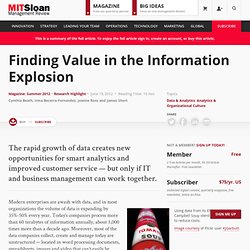
Using data from its ERP system, Campbell Soup identified opportunities to reduce costs. Image courtesy of Flickr user KJGarbutt. 5 Big Data Questions For CEOs. The Big Data Landscape.
How to Avoid the Big Data "Gotcha's" - Jill Dyche. By Jill Dyche | 11:00 AM April 17, 2012 As exciting as Big Data is, the executives I meet with are understandably leery of jumping in with both feet.
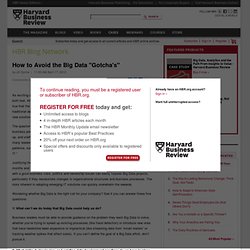
After all, some industries have been wrangling terabytes of information for years. And it’s true that the costs of sourcing, cleansing, loading, querying, and storing transaction data in traditional databases often exceed the anticipated benefits. How Will the "Age of Big Data" Affect Management? Summing up: Will Access to Big Data Further Enable Fact-Based Decision Making or … Analysis Paralysis?
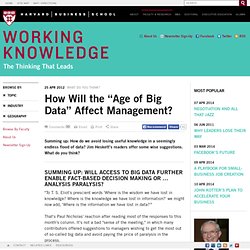
"To T. S. Eliot's prescient words 'Where is the wisdom we have lost in knowledge? Where is the knowledge we have lost in information? ' we might now add, 'Where is the information we have lost in data? '" That's Paul Nicholas' reaction after reading most of the responses to this month's column. Rachel Sterne: The City As A Social Platform. Data explosion requires companies to make informed decisions. May 1 2012, 15:27 PM The use of social networks, cloud computing and other technologies has enabled companies to acquire, store and analyze massive volumes of high-quality data. However, all this information will mean little to an organization that doesn't make exceptional decisions based on its evaluations. Big data, even with all its promising qualities, can prove to be harmful to companies that don't incorporate their findings into complex decision-making processes, according to a Harvard Business Review report by Corporate Executive Board.
Research by Corporate Executive Board found that there are three types of decision-makers in the business world. Big Data's Grass-Roots Revolution. Big data could be bigger than cloud and generate Irish jobs - EMC - Careers - Careers. Move over, cloud computing. There's a new global IT phenomenon, big data, that poses major job-creation opportunities for Ireland, says Jason Ward, EMC's country manager for Ireland.